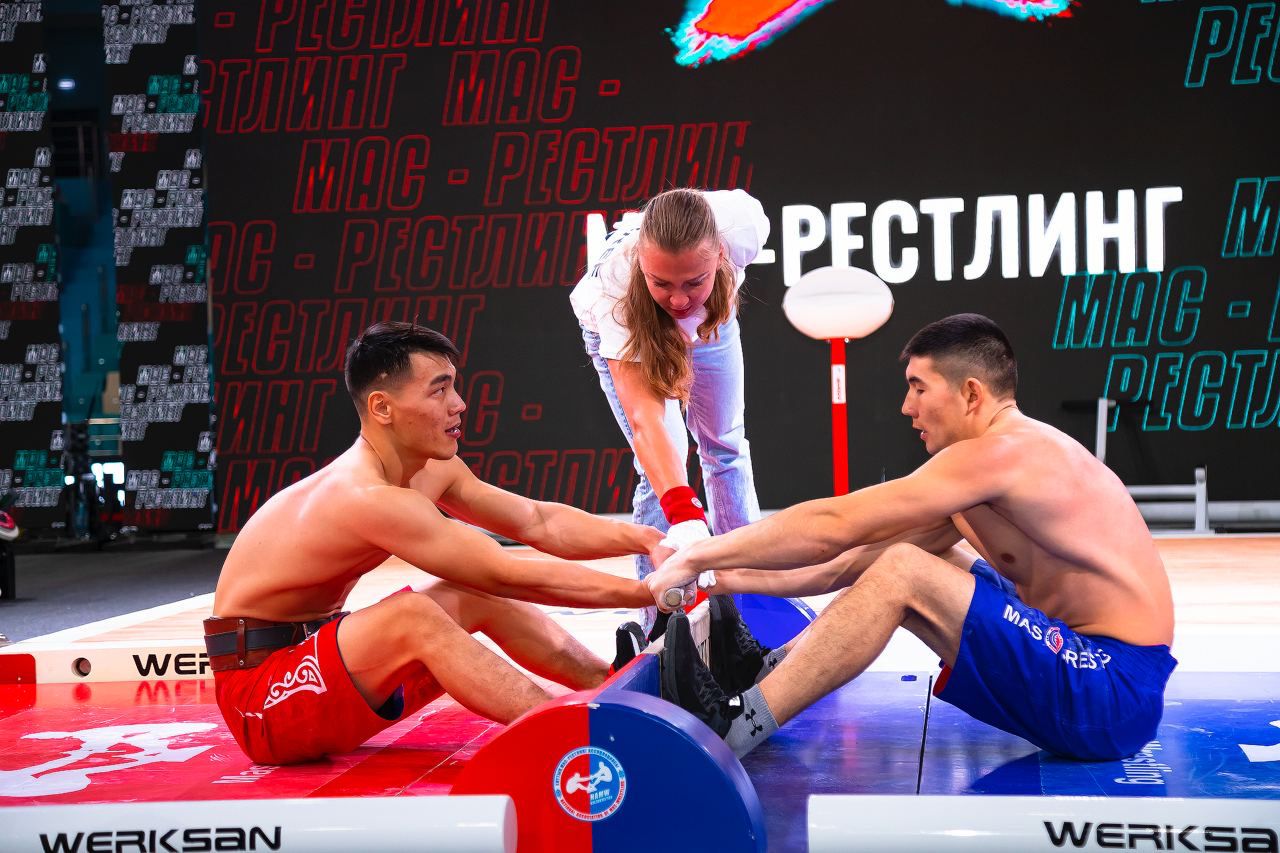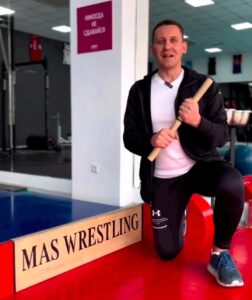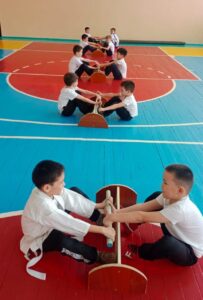ASTANA – Mas-wrestling is one of the 20 competitive sports at the World Nomad Games, featuring traditional games of Turkic nomadic peoples. This sport has deep historical roots, known by various names such as “mas-dardygi” in Yakutia (The Republic of Sakha), “tayak tartish” in the Kyrgyz Republic, and “tayak tartu” in Kazakhstan.

Photo credit: Fitisov’s personal archieve
The essence of mas-wrestling involves two athletes pulling a stick against each other while seated and braced against a support board, attempting to pull their opponent over or wrest the stick away.

Pavel Fitisov, vice-president of the Mas-Wrestling Federation of Kazakhstan and founder of center360.kz Photo credit: Fitisov’s Instagram page
In an interview with The Astana Times, Pavel Fitisov, vice president of the Mas-Wrestling Federation of Kazakhstan and founder of Center 360, explained that the sport became known as mas-wrestling as it gained international recognition.
“The word ‘mas’ translates to ‘wooden stick’ from Yakut, and ‘wrestling’ means ‘struggle’ in English, thus ‘stick tugging.’ Today, mas-wrestling is an international sport, no longer confined to any single country,” he said.
Mas-wrestling’s global popularity is largely credited to the Republic of Sakha. The Yakuts promoted the sport internationally, with significant contributions from Roman Dmitriev, the 1972 Olympic champion in freestyle wrestling, who proposed its modern name. Currently, the International Mas-Wrestling Federation boasts approximately 60 member countries worldwide.
Rules and techniques
Mas-wrestling is not just a test of strength but also a unique philosophy of physical and spiritual training integral to the Sakha culture. It develops motor and volitional qualities such as strength, agility, speed, endurance, courage, and decisiveness.
Winning in mas-wrestling requires balance and the ability to destabilize the opponent. This involves moving the feet along the support board, using the torso, and manipulating the stick horizontally and vertically (up to 90 degrees).
Fitisov emphasized the critical role of physical preparation in strength sports, noting the importance of developing all muscle groups.
“Weak arms affect grip strength, a weak back hinders load-bearing capacity, and weak legs compromise overall stability. However, above all, mental strength is paramount,” he said. “In the training, a holistic approach to strengthening the entire body is essential.”

The sport is practiced by men, women, children, and veterans alike. Photo credit: Fitisov’s personal archieve
Athletes need to react quickly, make swift decisions, and counterattack rapidly to prevent the opponent from snatching the stick in the first few seconds. Matches go up to two victories and can consist of two or three bouts.
According to Fitisov, the technique is also vital in mas-wrestling.
“The goal is to disorient the opponent. There are many different techniques on how you can snatch a stick or twist the stick out of your opponent’s hands. Emotional preparation is important too; we say it takes about 800 training sessions for an athlete to master key tactics in defense and attack,” he said.
The sport is practiced by men, women, children, and veterans alike. It is also safe, with well-warmed-up athletes facing no significant threats except for developing calluses from regular practice.
Global success and Nomad Games
“Over the years, the Mas-Wrestling Federation of Kazakhstan has achieved significant results both nationally and globally. We participated in the first international championship in 2014 in Yakutia, where I prepared the team and served as a referee. Our athletes ranked among the top five,” said Fitisov.
At the World Championships in 2016, the Kazakh team won one silver and two bronze medals, followed by four bronze medals in 2018. Between 2013 and 2023, they secured one bronze medal. They garnered two silver and seven bronze medals at the World Cup stages in 2013, 2015, and 2017. The team also performed at the Nomad Games in 2016 and 2018, winning two silver and four bronze medals, and at the Children of Asia Games, earning a bronze medal in 2016 and another in 2024.
“Kazakh people, like other nomadic peoples, have a natural affinity for struggle and contact sports. Mas-wrestling is important because it allows athletes to showcase their character and achievements. We teach them to win and lose with dignity. We now have representative offices in 14 regions nationwide,” he said.
Fitisov emphasized the importance of mass participation in developing the sport.
“We performed at the Nomad Games in 2016 and 2018, which helped popularize the sport. The Nomad Games in Kazakhstan offer a valuable opportunity for showcasing our athletes and gaining more visibility through live events and broadcasts,” he said. “My goal now is to grow trainers in the regions because when there are trainers, there will be sections. When there are sections, there will be more popularization.”
Fitisov has high expectations for the upcoming World Nomad Games, where athletes from over 30 countries will compete.
“We have many new and strong athletes who are preparing diligently despite being relatively new to mas-wrestling. We hope to win several medals and are striving for that,” he said.
He also emphasized the long-term development of athletes, fostering a new generation trained exclusively in mas-wrestling.
“For the past two years, we have been preparing to host the Nomad Games in collaboration with the game’s organizing committee. The Mas-Wrestling Federation of Kazakhstan, with support from the International Federation, is overseeing the technical preparations and preparing the Kazakh team,” said Fitisov.
“At the beginning of the year, we held a championship involving athletes from regions nationwide, followed by a qualifying tournament a month ago, where two teams were selected to prepare for the World Nomad Games. On July 22-28, we will hold a training camp to finalize the first team representing Kazakhstan at the games, with another training camp on Sept. 1-7,” he said.
Prospects and inclusive development
The prospects for mas-wrestling are great. It is a spectacular, dynamic sport that allows athletes to prove themselves on the international stage. The sport is developing step by step, with numerous top international tournaments, such as the Arnold Classic, Mr. Olympia, World Championships, and World Cups, available for athletes to compete in.
“To promote mas-wrestling further, I am working to make it accessible to people with different abilities. We have already held competitions for the blind, who can fight by hearing. We are also developing rules for wheelchair users and have had one such fight. Our goal is to adopt an inclusive approach to make mas-wrestling accessible to everyone,” said Fitisov.
The Center 360, dedicated to developing and supporting coaches and athletes, conducts training for mas-wrestling and adaptive sports.
“We also train the Kazakhstan national team and offer all-ability training designed for people with various abilities. Our training includes sessions with parents to ensure that changes are sustainable and inclusive. We create an environment where individuals with different abilities can train together, fostering a sense of community and completeness,” he said.
Fitisov plans to create a media league in Kazakhstan to further popularize the sport, where athletes from various sports can try mas-wrestling and leverage bloggers to promote it and create a show.
“Mas-wrestling is a thrilling spectacle, where fights can last from a split second to two minutes,” he said.
